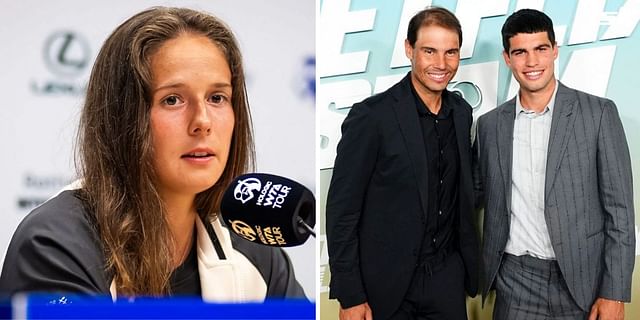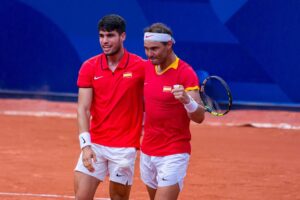
Daria Kasatkina has recently expressed her discontent with the frequent comparisons between Rafael Nadal and Carlos Alcaraz, emphasizing that the two Spanish tennis players have very little in common, despite what many in the tennis world believe. The Russian tennis star pointed out that while both players share the same nationality, their playing styles, personalities, and approaches to the game are distinct, and she believes that it is unfair and “wrong” to constantly label young players as the successors to older legends.
Alcaraz, who burst onto the scene as a teenage sensation, has been widely compared to the ‘Big 3’ of tennis — Nadal, Roger Federer, and Novak Djokovic. Many experts and fans have commented on how Alcaraz’s game appears to be a fusion of traits from these three legends, especially Nadal, given that Alcaraz has often mentioned Nadal as his tennis idol. As they are both Spanish and highly emotional players, the comparisons have naturally leaned towards Nadal. However, Kasatkina feels that such comparisons are not only misplaced but also create unnecessary pressure on young players like Alcaraz.
Daria Kasatkina’s Thoughts on Comparisons
In an interview with TNNS, Kasatkina was vocal about her frustration with the trend of comparing emerging talents with established legends. She expressed her disapproval of the idea of labeling younger players as the “next” versions of older players, explaining that it diminishes the individuality of the younger generation. She believes that each player should be appreciated for their unique talents and contributions to the sport rather than being constantly measured against predecessors.
“I like supporting the Spanish players. Well, not a crush, but I like the way Alcaraz plays,” Kasatkina remarked. “No, I cannot see Nadal in him. He’s a different person. I’ve never really liked it when they put labels on young players, labels from older players. It’s just wrong.”
Kasatkina went on to highlight how such comparisons are prevalent not just in tennis but also in other sports like football. She noted that fans and the media are always eager to find the “next Messi” or the “next Ronaldo,” much like the constant search for the “next Nadal” or “next Federer” in tennis. To her, this mindset is problematic because it overlooks the fact that players from different generations have their own unique styles, strengths, and personalities.
“It just feels so wrong. I mean, why? Different people, different level. First of all, time doesn’t stand still; it’s a different era, everything is different, why would you compare the new generation to the previous one? Everybody is unique and different,” Kasatkina said.
Distinct Playing Styles and Personalities
Kasatkina further argued that while Nadal and Alcaraz share a few similarities, such as their Spanish heritage and their emotional nature on the court, their differences far outweigh their commonalities. According to her, Nadal and Alcaraz exude entirely different vibes when they are on the court, and their playing styles are distinct from one another.
“Even on the court, Rafa and Alcaraz have a different vibe from each other. What they have in common is that they’re both Spanish. Wow, really? And their ‘Vamos’ and being emotional too, but I think it has more to do with their fiery personalities,” she explained. “But their styles of play are completely different. Alcaraz is a righty. I think they’re very different, and I really enjoy watching Alcaraz play. He knows how to put on a show.”
Kasatkina’s take brings to light the challenges faced by players like Alcaraz, who are often seen through the lens of their predecessors rather than being given space to establish their own identity. By focusing on the differences rather than the similarities, Kasatkina makes a case for appreciating Alcaraz as a unique talent in his own right, rather than as a new version of Nadal.
Rafael Nadal on the Comparisons
Interestingly, Rafael Nadal has taken a more relaxed stance on the comparisons between himself and Carlos Alcaraz. In contrast to Kasatkina’s strong opposition to the constant parallels, Nadal seems to welcome the comparisons, noting that they do not negatively affect Alcaraz. During an appearance on the Spanish talk show El Hormiguero, the 22-time Grand Slam champion shared his belief that Alcaraz is more than capable of living up to the expectations and carving out his own path in tennis.
“I don’t think the comparison hurts Alcaraz. He’s good enough,” Nadal said. “He will go his own way, and it’s a nice coincidence that, after my career, someone like Carlos comes along. It’s difficult in the same country to have two players among the best in history.”

Nadal’s comments reflect his confidence in Alcaraz’s abilities and suggest that, while the comparisons may exist, they do not take away from Alcaraz’s individual talent and potential. Nadal seems to understand that these types of comparisons are natural in sports, especially when one player is succeeding another from the same country. However, he believes that Alcaraz has what it takes to handle the pressure and become a legend in his own right.
Alcaraz and Nadal’s Partnership
Nadal and Alcaraz had the opportunity to form a blockbuster doubles partnership at the Paris Olympics, where they represented Spain. Although they did not secure a medal and were knocked out in the quarterfinals, their partnership garnered significant attention from tennis fans worldwide. The idea of two of Spain’s greatest players joining forces excited fans, even though they did not achieve the desired result.
The two were also expected to play together at the 2024 Laver Cup, where Team Europe would have been led by Alcaraz. However, Nadal had to pull out of the event, leaving Alcaraz to lead the team alongside other top players like Daniil Medvedev, Grigor Dimitrov, and Alexander Zverev.
While Daria Kasatkina has voiced her frustration with the constant comparisons between Carlos Alcaraz and Rafael Nadal, it’s clear that these parallels are inevitable, given their shared nationality and Alcaraz’s admiration for Nadal. However, Kasatkina’s points about individuality and the uniqueness of each player are valid, as every generation brings its own style and characteristics to the sport.
Nadal himself appears to embrace the comparisons and believes that they don’t put undue pressure on Alcaraz. As Alcaraz continues to rise through the ranks and build his own legacy, it will be important for fans and the media to appreciate him for his individual talents, just as Kasatkina has emphasized. At the same time, the legacy of players like Nadal will always loom large, serving as both inspiration and a challenge for the next generation of tennis stars.
Leave a Reply